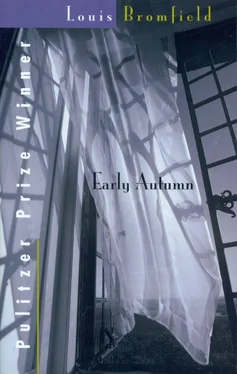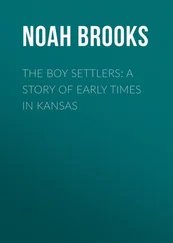At sight of her, the old lady came forward with little fluttering cries to fling her arms about her late husband’s niece. Her manner was that of a shepherd receiving a lost sheep, a manner filled with forgiveness and pity and condescension. The tears welled easily into her eyes and streamed down her face.
Sabine permitted herself, frigidly, to be embraced, and said, “But you don’t look a day older, Aunt Cassie. You look stronger than ever.” It was a remark which somehow set the whole tone of the relationship between them, a remark which, though it sounded sympathetic and even complimentary, was a harsh thing to say to a woman who had cherished all her life the tradition of invalidism. It was harsh, too, because it was true. Aunt Cassie at forty-seven had been as shriveled and dried as she was now, twenty years later.
The old woman said, “My dear girl, I am miserable … miserable.” And drying the tears that streamed down her face, she added, “It won’t be long now until I go to join dear Mr. Struthers.”
Sabine wanted suddenly to laugh, at the picture of Aunt Cassie entering Paradise to rejoin a husband whom she had always called, even in the intimacy of married life, “Mr. Struthers.” She kept thinking that Mr. Struthers might not find the reunion so pleasant as his wife anticipated. She had always held a strange belief that Mr. Struthers had chosen death as the best way out.
And she felt a sudden almost warm sense of returning memories, roused by Aunt Cassie’s passion for overstatement. Aunt Cassie could never bring herself to say simply, “I’m going to die,” which was not at all true. She must say, “I go to join dear Mr. Struthers.”
Sabine said, “Oh, no. … Oh, no. … Don’t say that.”
“I don’t sleep anymore. I barely close my eyes at night.”
She had seated herself now and was looking about her, absorbing everything in the room, the changes made by the dreadful O’Hara, the furniture he had bought for the house. But most of all she was studying Sabine, devouring her with sidelong, furtive glances; and Sabine, knowing her so well, saw that the old woman had been given a violent shock. She had come prepared to find a broken, unhappy Sabine and she had found instead this smooth, rather hard and self-contained woman, superbly dressed and poised, from the burnished red hair (that straight red hair the aunts had once thought so hopeless) to the lizard-skin slippers—a woman who had obviously taken hold of life with a firm hand and subdued it, who was in a way complete.
“Your dear uncle never forgot you for a moment, Sabine, in all the years you were away. He died, leaving me to watch over you.” And again the easy tears welled up.
(“Oh,” thought Sabine, “you don’t catch me that way. You won’t put me where I once was. You won’t even have a chance to meddle in my life.”)
Aloud she said, “It’s a pity I’ve always been so far away.”
“But I’ve thought of you, my dear. … I’ve thought of you. Scarcely a night passes when I don’t say to myself before going to sleep, ‘There is poor Sabine out in the world, turning her back on all of us who love her.’” She sighed abysmally. “I have thought of you, dear. I’ve prayed for you in the long nights when I have never closed an eye.”
And Sabine, talking on half-mechanically, discovered slowly that, in spite of everything, she was no longer afraid of Aunt Cassie. She was no longer a shy, frightened, plain little girl; she even began to sense a challenge, a combat which filled her with a faint sense of warmth. She kept thinking, “She really hasn’t changed at all. She still wants to reach out and take possession of me and my life. She’s like an octopus reaching out and seizing each member of the family, arranging everything.” And she saw Aunt Cassie now, after so many years, in a new light. It seemed to her that there was something glittering and hard and a little sinister beneath all the sighing and tears and easy sympathy. Perhaps she (Sabine) was the only one in all the family who had escaped the reach of those subtle, insinuating tentacles. … She had run away.
Meanwhile Aunt Cassie had swept from a vivid and detailed description of the passing of Mr. Struthers into a catalogue of neighborhood and family calamities, of deaths, of broken troths, financial disasters, and the appearance on the horizon of the “dreadful O’Hara.” She reproached Sabine for having sold her land to such an outsider. And as she talked on and on she grew less and less human and more and more like some disembodied, impersonal force of nature. Sabine, watching her with piercing green eyes, found her a little terrifying. She had sharpened and hardened with age.
She discussed the divorces which had occurred in Boston, and at length, leaning forward and touching Sabine’s hand with her thin, nervous one, she said brokenly: “I felt for you in your trouble, Sabine. I never wrote you because it would have been so painful. I see now that I evaded my duty. But I felt for you. … I tried to put myself in your place. I tried to imagine dear Mr. Struthers being unfaithful to me … but, of course, I couldn’t. He was a saint.” She blew her nose and repeated with passion, as if to herself, “A saint!”
(“Yes,” thought Sabine, “a saint … if ever there was one.”) She saw that Aunt Cassie was attacking her now from a new point. She was trying to pity her. By being full of pity the old woman would try to break down her defenses and gain possession of her.
Sabine’s green eyes took one hard, glinting look. “Did you ever see my husband?” she asked.
“No,” said Aunt Cassie, “but I’ve heard a great deal of him. I’ve been told how you suffered.”
Sabine looked at her with a queer, mocking expression. “Then you’ve been told wrongly. He is a fascinating man. I did not suffer. I assure you that I would rather have shared him with fifty other women than have had any one of the men about here all to myself.”
There was a frank immorality in this statement which put Aunt Cassie to rout, bag and baggage. She merely stared, finding nothing to say in reply to such a speech. Clearly, in all her life she had never heard anyone say a thing so bald and so frank, so completely naked of all pretense of gentility.
Sabine went on coldly, pushing her assault to the very end. “I divorced him at last, not because he was unfaithful to me, but because there was another woman who wanted to marry him… a woman whom I respect and like … a woman who is still my friend. Understand that I loved him passionately … in a very fleshly way. One couldn’t help it. I wasn’t the only woman. … He was a kind of devil, but a very fascinating one.”
The old woman was a little stunned but not by any means defeated. Sabine saw a look come into her eyes, a look which clearly said, “So this is what the world has done to my poor, dear, innocent little Sabine!” At last she said with a sigh, “I find it an amazing world. I don’t know what it is coming to.”
“Nor I,” replied Sabine with an air of complete agreement and sympathy. She understood that the struggle was not yet finished, for Aunt Cassie had a way of putting herself always in an impregnable position, of wrapping herself in layer after layer of sighs and sympathy, of charity and forgiveness, of meekness and tears, so that in the end there was no way of suddenly tearing them aside and saying, “There you are … naked at last, a horrible meddling old woman!” And Sabine kept thinking, too, that if Aunt Cassie had lived in the days of her witch-baiting ancestor, Preserved Pentland, she would have been burned for a witch.
And all the while Sabine had been suffering, quietly, deep inside, behind the frankly painted face … suffering in a way which no one in the world had ever suspected; for it was like tearing out her heart, to talk thus of Richard Callendar, even to speak his name.
Читать дальше












